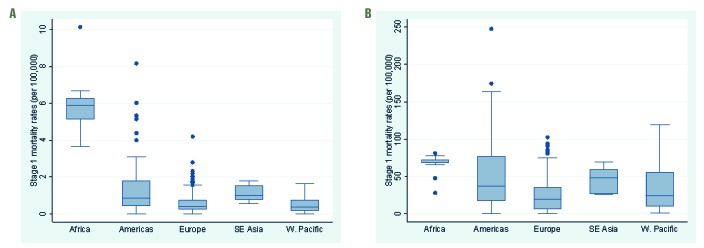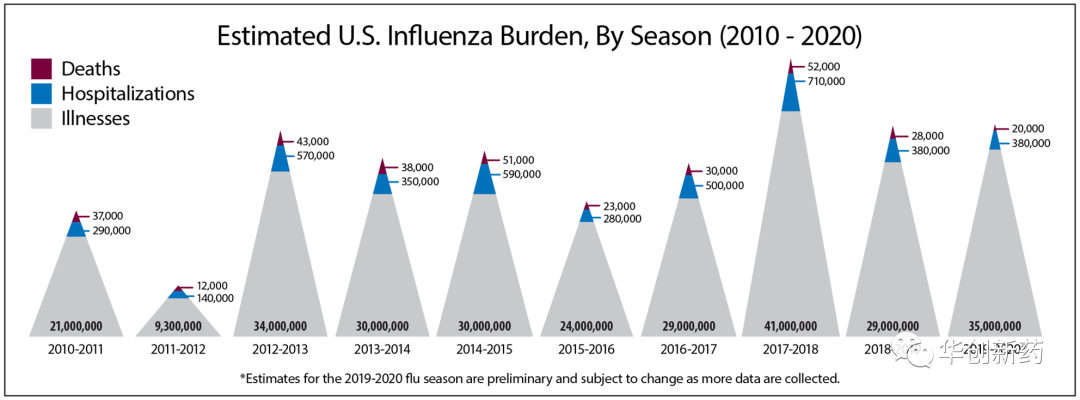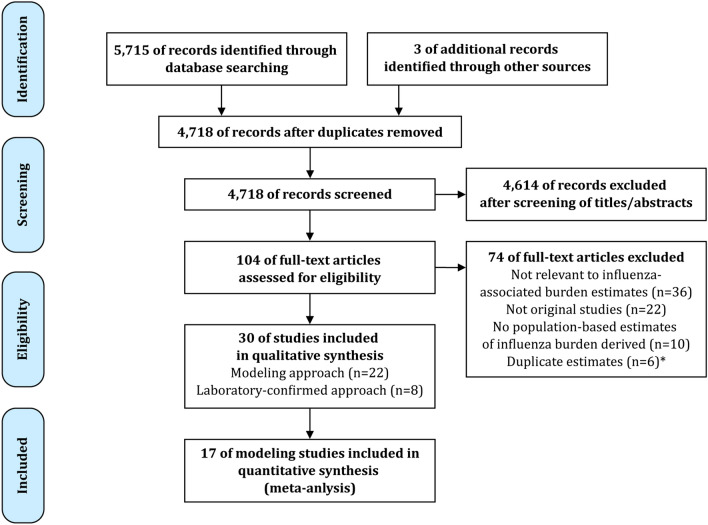天天说新冠病毒是大号流感,流感的死亡率究竟是多少?
时间:2022-01-17 10:17:43 热度:37.1℃ 作者:网络
首先看全球情况,主要基于这篇文献:Global mortality associated with seasonal influenza epidemics
谈到流感的死亡率,一般有这几个影响因素:年龄,地区,流感类型(甲型还是乙型),统计口径。当然,这一点对新冠同样适用。
大于65岁死亡率在万分之五-千分之一水平,小于65岁死亡率低于万分之一,当然不同国家和地区差别很大。

Boxplot of the Stage 1 country estimates of influenza-associated excess respiratory mortality rates per 100 000 by WHO region, under 65 and over 65. Panel A. Age <65. Panel B. Age ≥65.
通过数学模型估计认为,在65岁以下人群中,流感相关呼吸道超额死亡(EMR)为每10万人0.1-6.4人;65-74岁为每10万人2.9-44人;75岁以上每10万人为17.9-223.5人。在全球92个国家中,每年5岁以下儿童死亡流感人数达到9243-105 690人。
美国:CDC披露流感数据,死亡率大致在千分之一水平。
主要是因为美国只要将合并有流感的死亡,全部统计在内,因此,流感每年会导致3-6万美国人死亡,更确切地应该称为“流感相关死亡”。新冠统计同样如此。

国内:
第1篇,2021年发表的荟萃分析,Influenza‑associated disease burden in China: a systematic review and meta‑analysis
文章搜索了3个英文和4个中文数据库,系统评价和荟萃分析2005年至2019年发表的数据。

中国统计流感的死亡,必需是流感是主要死亡病因,才会被计入流感导致的死亡,因此,死亡风险约万分之一。
Pooled influenza-associated mortality rates per 100,000 persons by cause of death and age group.
| Outcome | No. of estimates | Influenza-associated mortality rates (95% CI) |
|---|---|---|
| All-cause | ||
| All ages | 23 | 14.33 (11.56, 17.10) |
| Age-standardized | 12 | 14.76 (11.54, 17.98) |
| < 65 years | 12 | 2.67 (2.27, 3.07) |
| ≥ 65 years | 17 | 122.79 (92.23, 153.34) |
| Respiratory and circulatory disease | ||
| All ages | 20 | 10.89 (8.71, 13.07) |
| Age-standardized | 12 | 11.01 (8.77, 13.26) |
| < 65 years | 12 | 1.55 (1.30, 1.80) |
| ≥ 65 years | 16 | 95.29 (71.67, 118.92) |
| Respiratory disease | ||
| All ages | 32 | 5.84 (4.66, 7.03) |
| Age-standardized | 27 | 5.03 (3.91, 6.16) |
| < 65 years | 27 | 1.23 (0.64, 1.82) |
| ≥ 65 years | 28 | 43.71 (34.33, 53.09) |
| Pneumonia and influenza* | ||
| All ages | 12 | 0.67 (0.27, 1.07) |
| ≥ 65 years | 10 | 8.73 (1.10, 16.35) |
| Chronic obstructive pulmonary disease* | ||
| All ages | 8 | 2.66 (1.50, 3.83) |
| ≥ 65 years | 5 | 20.67 (5.08, 36.26) |
| Ischemic heart disease* | ||
| All ages | 7 | 2.57 (0.97, 4.18) |
| ≥ 65 years | 5 | 19.15 (6.97, 31.33) |
*Due to the small numbers (< 5) of the reported estimates for age-standardized and < 65 years, the meta-analyses were not performed.
由中国疾控中心、复旦大学、香港大学研究团队合作开展的「2010-2015 年中国流感相关呼吸系统疾病超额死亡:一项基于人群的研究」在《柳叶刀-公共卫生》杂志发表。
结果显示,2010~2011 至 2014-2015 年度,全国平均每年有 88,100 例(95% CI: 84,200~92,000)流感相关的呼吸系统疾病超额死亡,占所有呼吸疾病死亡的 8.2%(95% CI: 7.9~8.6),超额死亡率为 6.5(95% CI: 6.3~6.8)/10 万,年龄标化的超额死亡率为 5.9(95% CI: 5.5~6.3)/10 万。约 80% 的流感相关呼吸系统疾病超额死亡发生在 60 岁以上老人,该年龄组超额死亡率(38.5/10 万)远高于 60 岁以下人群(1.5/10 万)。
22 个省份流感相关呼吸系统疾病超额死亡率存在空间异质性(Q = 784,P<0.001,I2 = 98%)。随机效应 meta 回归模型在纳入地区分类(西部、中部、东部)协变量后,发现西部和东部的年均超额死亡率高于中部地区。
各型/亚型流感病毒所导致的超额呼吸死亡率存在差异。A(H1N1)pdm09,A(H3N2) 和 B 型流感病毒导致的年均超额呼吸死亡率分别为 1.6(95% CI: 1.5~1.7)、2.6(2.4~2.8)和 2.3(2.1~2.6)/10 万。60 岁及以上老人中,A(H3N2) 和 B 型流感病毒导致的年均超额呼吸死亡率高于 A(H1N1)pdm09。
另外一篇,2019年发表的荟萃分析:中国流感死亡负担研究系统综述,共纳入17篇文献,提取了描述特征、建模方法及相应结果的基本信息。
17篇文献均采用了间接模型的研究方法,研究指标均为超额死亡率,其中14篇采用回归模型;主要以全死因(16篇)、呼吸及循环系统疾病(14篇)和肺炎及流感(10篇)作为流感相关死因。老人死亡负担较重,相关全死因、呼吸及循环系统疾病和肺炎及流感超额死亡率最低分别为49.57/10万、30.80/10万和0.69/10万,最高分别为228.16/10万、170.20/10万和30.35/10万;非老年组最低分别为-0.27/10万、-0.08/10万和0.04/10万,最高为3.63/10万、2.6/10万和0.91/10万人。北方地区全人群流感相关全死因超额死亡率较高,最低为7.8/10万,最高为18.0/10万,南方略低,最低为6.11/10万,最高为18.7/10万。不同流感病毒亚型导致的死亡也存在差异,其中A(H3N2)和B型导致的死亡负担较重。
参考文献:
Iuliano AD, et al. Estimates of global seasonal influenza-associated respiratory mortality: a modelling study.Lancet. 2018. PMID: 29248255
Ahmed M, et al. Estimates of seasonal influenza-associated mortality in Bangladesh, 2010-2012.Influenza Other Respir Viruses. 2018
Paget J, et al. Global mortality associated with seasonal influenza epidemics: New burden estimates and predictors from the GLaMOR Project.J Glob Health. 2019.
Li L, Liu Y, Wu P, et al. Influenza-associated excess respiratory mortality in China, 2010-15: a population-based study. Lancet Public Health 2019,4: e473–81.
李飒, 刘思家, 朱爱琴, 等. 中国流感死亡负担研究系统综述 [J] . 中华预防医学杂志,2019,53 (10): 1049-1055. DOI: 10.3760/cma.j.issn.0253-9624.2019.10.018
Li J, Chen Y, Wang X, Yu H.Influenza-associated disease burden in mainland China: a systematic review and meta-analysis.Sci Rep. 2021 Feb 3;11(1):2886. doi: 10.1038/s41598-021-82161-z


